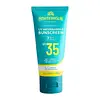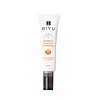What's inside
What's inside
 Key Ingredients
Key Ingredients

 Benefits
Benefits

 Concerns
Concerns

 Ingredients Side-by-side
Ingredients Side-by-side

Water
Skin ConditioningNeopentyl Glycol Diheptanoate
EmollientGlycerin
HumectantButyl Methoxydibenzoylmethane
UV AbsorberEthylhexyl Methoxycinnamate
UV AbsorberCetyl Alcohol
EmollientSilica
AbrasiveUrea
BufferingOctocrylene
UV AbsorberHydrolyzed Jojoba Esters
Skin ConditioningHelianthus Annuus Seed Oil
EmollientVitis Vinifera Leaf Extract
Skin ConditioningCentella Asiatica Extract
CleansingAvena Sativa Kernel Extract
AbrasiveRosmarinus Officinalis Leaf Extract
AntimicrobialCeramide AP
Skin ConditioningCeramide As
Skin ConditioningCeramide EOP
Skin ConditioningCeramide NP
Skin ConditioningCeramide Ns
Skin ConditioningTocopherol
AntioxidantLaminaria Digitata Extract
Skin ProtectingCholesterol
EmollientSodium Acrylate/Sodium Acryloyldimethyl Taurate Copolymer
Emulsion StabilisingButylene Glycol
HumectantGlyceryl Stearate
EmollientPEG-100 Stearate
Isohexadecane
EmollientPolysorbate 80
EmulsifyingTriethanolamine
BufferingLecithin
EmollientBHT
AntioxidantPhenoxyethanol
PreservativeDisodium EDTA
Sorbitan Oleate
EmulsifyingPropanediol
SolventEthyl Ferulate
AntioxidantPolyglyceryl-5 Trioleate
EmollientPropylene Glycol
HumectantDisodium Uridine Phosphate
Skin Conditioning1,2-Hexanediol
Skin ConditioningHydrogenated Lecithin
EmulsifyingCitric Acid
BufferingSodium Benzoate
MaskingPotassium Sorbate
PreservativeCetyl-Pg Hydroxyethyl Palmitamide
Skin ConditioningWater, Neopentyl Glycol Diheptanoate, Glycerin, Butyl Methoxydibenzoylmethane, Ethylhexyl Methoxycinnamate, Cetyl Alcohol, Silica, Urea, Octocrylene, Hydrolyzed Jojoba Esters, Helianthus Annuus Seed Oil, Vitis Vinifera Leaf Extract, Centella Asiatica Extract, Avena Sativa Kernel Extract, Rosmarinus Officinalis Leaf Extract, Ceramide AP, Ceramide As, Ceramide EOP, Ceramide NP, Ceramide Ns, Tocopherol, Laminaria Digitata Extract, Cholesterol, Sodium Acrylate/Sodium Acryloyldimethyl Taurate Copolymer, Butylene Glycol, Glyceryl Stearate, PEG-100 Stearate, Isohexadecane, Polysorbate 80, Triethanolamine, Lecithin, BHT, Phenoxyethanol, Disodium EDTA, Sorbitan Oleate, Propanediol, Ethyl Ferulate, Polyglyceryl-5 Trioleate, Propylene Glycol, Disodium Uridine Phosphate, 1,2-Hexanediol, Hydrogenated Lecithin, Citric Acid, Sodium Benzoate, Potassium Sorbate, Cetyl-Pg Hydroxyethyl Palmitamide
Water
Skin ConditioningZinc Oxide
Cosmetic ColorantC12-15 Alkyl Benzoate
AntimicrobialSimmondsia Chinensis Seed Oil
EmollientButyloctyl Salicylate
Skin ConditioningCetyl Alcohol
EmollientPropanediol
SolventCaprylyl Methicone
Skin ConditioningIsotridecyl Isononanoate
EmollientTriethylhexanoin
MaskingHdi/Trimethylol Hexyllactone Crosspolymer
Glyceryl Stearate
EmollientPEG-100 Stearate
Cyclopentasiloxane
EmollientNeopentyl Glycol Diheptanoate
EmollientTrimethylsiloxysilicate
EmollientPolyhydroxystearic Acid
EmulsifyingArgania Spinosa Kernel Oil
EmollientPhenoxyethanol
PreservativeBisabolol
MaskingTocopheryl Acetate
AntioxidantDipentaerythrityl Tri-Polyhydroxystearate
EmollientJojoba Esters
EmollientTriethoxycaprylylsilane
Xanthan Gum
EmulsifyingDisodium EDTA
Ethylhexylglycerin
Skin ConditioningSilica
AbrasiveWater, Zinc Oxide, C12-15 Alkyl Benzoate, Simmondsia Chinensis Seed Oil, Butyloctyl Salicylate, Cetyl Alcohol, Propanediol, Caprylyl Methicone, Isotridecyl Isononanoate, Triethylhexanoin, Hdi/Trimethylol Hexyllactone Crosspolymer, Glyceryl Stearate, PEG-100 Stearate, Cyclopentasiloxane, Neopentyl Glycol Diheptanoate, Trimethylsiloxysilicate, Polyhydroxystearic Acid, Argania Spinosa Kernel Oil, Phenoxyethanol, Bisabolol, Tocopheryl Acetate, Dipentaerythrityl Tri-Polyhydroxystearate, Jojoba Esters, Triethoxycaprylylsilane, Xanthan Gum, Disodium EDTA, Ethylhexylglycerin, Silica
Ingredients Explained
These ingredients are found in both products.
Ingredients higher up in an ingredient list are typically present in a larger amount.
Cetyl Alcohol is a fatty alcohol. Fatty Alcohols are most often used as an emollient or to thicken a product.
Its main roles are:
Though it has "alcohol" in the name, it is not related to denatured alcohol or ethyl alcohol.
The FDA allows products labeled "alcohol-free" to have fatty alcohols.
Learn more about Cetyl AlcoholDisodium EDTA plays a role in making products more stable by aiding other preservatives.
It is a chelating agent, meaning it neutralizes metal ions that may be found in a product.
Disodium EDTA is a salt of edetic acid and is found to be safe in cosmetic ingredients.
Learn more about Disodium EDTAGlyceryl Stearate is a mix of glycerin and stearic acid.
It is used to stabilize the mixing of water and oil ingredients. By preventing these ingredients from separating, it can help elongate shelf life. It can also help thicken the product's texture.
As an emollient, it helps soften skin and supports barrier-replenishing ingredients.
In cosmetics, Glyceryl Stearate is often made from vegetable oils or synthetically produced.
This ingredient may not be fungal-acne safe
Fun fact: The human body also creates Glyceryl Stearate naturally.
Learn more about Glyceryl StearateWe don't have a description for Neopentyl Glycol Diheptanoate yet.
Peg-100 Stearate is an emollient and emulsifier. As an emollient, it helps keep skin soft by trapping moisture in. On the other hand, emulsifiers help prevent oil and water from separating in a product.
PEGS are a hydrophilic polyether compound . There are 100 ethylene oxide monomers in Peg-100 Stearate. Peg-100 Stearate is polyethylene glycol ester of stearic acid.
Phenoxyethanol is a preservative that has germicide, antimicrobial, and aromatic properties. Studies show that phenoxyethanol can prevent microbial growth. By itself, it has a scent that is similar to that of a rose.
It's often used in formulations along with Caprylyl Glycol to preserve the shelf life of products.
Propanediol is an all-star ingredient. It softens, hydrates, and smooths the skin.
It’s often used to:
Propanediol is not likely to cause sensitivity and considered safe to use. It is derived from corn or petroleum with a clear color and no scent.
Learn more about PropanediolSilica, also known as silicon dioxide, is a naturally occurring mineral. It is used as a fine, spherical, and porous powder in cosmetics.
Though it has exfoliant properties, the function of silica varies depending on the product.
The unique structure of silica enhances the spreadability and adds smoothness, making it a great texture enhancer.
It is also used as an active carrier, emulsifier, and mattifier due to its ability to absorb excess oil.
In some products, tiny microneedles called spicules are made from silica or hydrolyzed sponge. When you rub them in, they lightly polish away dead skin layers and enhance the penetration of active ingredients.
Learn more about SilicaWater. It's the most common cosmetic ingredient of all. You'll usually see it at the top of ingredient lists, meaning that it makes up the largest part of the product.
So why is it so popular? Water most often acts as a solvent - this means that it helps dissolve other ingredients into the formulation.
You'll also recognize water as that liquid we all need to stay alive. If you see this, drink a glass of water. Stay hydrated!
Learn more about Water